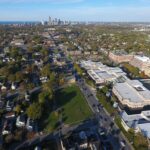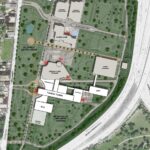- Neighborhood Type: Mixed-Use
- Size: 585 Acres
- Neighborhood Type: Mixed-Use
The MetroHealth System spearheaded the first hospital-led certified EcoDistrict in the country. This collaborative effort included multiple partners and residents all seeking to make
the most meaningful positive impact on Clark-Fulton, the neighborhood the hospital has anchored for 150 years. The EcoDistrict represents a paradigm shift in neighborhood
revitalization, one that focuses on health equity and community well-being.
Clark-Fulton, a neighborhood just west of Downtown Cleveland, is a proud but marginalized community — a hardscrabble, largely Latinx and African American neighborhood. By adopting
the EcoDistricts Protocol and seeking certification to help guide a two-year community master plan process, the partners in Clark-Fulton have achieved both a local vision and something genuinely transformational and potentially of national importance.
As outlined in the EcoDistricts Protocol, the District Team focused on addressing the root causes of inequity. The objective is to reduce unjust health and socioeconomic disparities in this neighborhood and thereby create a model for enhancing the overall health, wellbeing, and resilience of Clark-Fulton and other communities like it.
Collaborators include MetroHealth, the City of Cleveland, Ward 14 Councilwoman Jasmin Santana, the Metro West Community Development Organization, the Cleveland Foundation, and a cohort of eight resident ambassadors. Together, this group aligned around a shared vision and bold goals for the neighborhood.
The partners sought to better understand the relationship between health outcomes and poverty; substandard housing; food deserts; unaffordable and inaccessible nutrition; poor early childhood support; inferior educational programs and opportunities; difficult working conditions; inadequate neighborhood and community networks; remoteness of safe green spaces; and structural discrimination based on race and other attributes. These factors are what healthcare stakeholders have long recognized as the social determinants of health. These non-clinical factors play a much more significant role in health outcomes than medical care itself.
But these factors, the social determinants of health, are parts of a highly complex system of interlocking and interdependent parts. Systems-level challenges require systems-level solutions. The methods of change pursued so far, primarily one-time siloed project-based initiatives, haven’t worked. MetroHealth and its District Team partners recognized the EcoDistricts Protocol
represents a systems-level theory of change, particularly well-suited to address the social determinants of health at the neighborhood scale. Like the Protocol, the district team sees
health and wellbeing as highly interdependent with other priorities and imperatives.
The EcoDistrict spans approximately 585 acres bounded by Interstate 90/490 to the north, I-71 to the east and south, and Fulton Road to the west. Thanks to the EcoDistricts certification
process, Clark-Fulton is ready for collective action and deliberative democracy. Better health and more wealth for all is the North Star and the journey continues.






